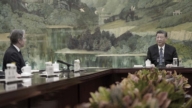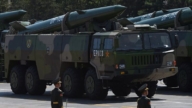【新唐人2013年03月16日讯】中国大陆当局近期决定撤销原铁道部,并成立“中国铁路总公司”负责企业经营职能,14号已正式挂牌。不过,原铁道部总负债2万6千6百亿元,将由新组建的铁路总公司继承。未来如何处置铁道部的债务,以及公司上市投、融资的安排﹖中国社会各界都在关注。
3月14号上午,全国人大表决通过了国务院机构改革方案,铁道部正式被拆分。据了解,原铁道部职能将划分为三。其中的行政职责,划入交通运输部,并组建国家铁路局,承担铁道调度指挥;和“中国铁路总公司”,负责经营建设。
新组建的“中国铁路总公司”将原铁道部的相关资产、负债和人员划入。而原铁道部对所属的18个铁路局、和3个专业运输公司,以及其他企业的权益,成为“中国铁路总公司”的国有资本。
“中国铁路总公司”经国务院批准设立,为国家授权投资和国家控股的“国有独资企业”,盛光祖为公司法定代表人。而财政部代表国务院履行出资人职责,交通运输部、国家铁路局对公司进行行业监管。公司注册资金为1万360亿元人民币。不进行资产评估和审计验资。
根据国务院办公厅发布的《国务院关于组建中国铁路总公司有关问题的批复》公文内容,“中国铁路总公司”的国有资产收益,除按照规定执行外,历史债务问题没有解决前,国家对公司暂不征收国有资产收益。而且在保证有关企业合法权益和自身发展需要的前提下,公司可集中部分国有资产收益,由公司用于再投入和结构调整。
北京市民:“这就是一种变相的把国有的变成私有的吧!这等于又不花钱、又不摀的,又一万多个亿又没了嘛!这就是变相的抢劫!”
另外,根据铁道部最新的债券募集书披露,截至2012年9月末,铁道部总资产4.3万亿元,总负债2.66万亿元,主要包括1.4万亿的银行贷款,以及近8000亿的债券。
据了解,铁道部大部分的债务,都是2008年以来所谓“铁路建设大跃进”所积欠。
香港媒体报导,“中国人民银行”相关负责人日前表态:铁道部现有全部债务将由中国铁路总公司继承,同时中共当局将继续支持这些债务,不会因为铁道部的撤销而影响。
报导说,分析人士认为,面对如此庞大的债务重压,在政企分开的道路上,当局不得不延续这种“藕断丝连”才能实现债务的平稳过渡。但潜在的隐忧依旧“难解”!
分析说,“中国铁路总公司”未来的路并不好走。可能因为自身偿债实力偏弱,投资者将要求更高的风险溢价。
不仅如此,一位基金公司人士表示,如果债务交给了铁路总公司,作为一家企业的债务,要想视为中央政府债权或公共部门债权,必须经过特批。仅作为央企的话,很可能面对100%的风险权重,将极大的影响商业银行的投资积极性。
另一个致命软肋是授信集中度。报导说,近年来,商业银行对铁道债的需求明显变弱,不仅在于铁道部激进扩张带来的基本面恶化,也与所谓“监管指标”的约束有关。除非继续出台更强的政府信用背书政策,否则“铁道债”的实际信用级别,可能被长期削弱。
全球自由信息运动创办人张新宇:“因为以前铁道部是独立的一个部门,非常庞大…它的官僚权力非常大,完全是国营的,不是自负盈亏的。这样以来的话,它那官员或者管理人根本就是…光考虑管着人,而不考虑里子。铁道部早就应该这样做的事情(撤销),做了这么多年,才把它做成现在这样,我觉得就说明中国政治改革无望!”
另一方面,随着铁道部正式撤销,中国18个铁路局的命运也备受关注。专家建议重组18个地方铁路局。
采访/陈汉 编辑/周平 后制/孙宁
China Railway General Corporation Will Inherit MOR Debt
The Chinese authority decided recently to withdraw
the Ministry of Railways(MOR) and to found “China Railway General Corporation”.
This will take over the business functions of MOR.
The new company started its business on March 14.
The company inherits the debt of MOR which is
2,660 billion RMB.
How can the new company deal with this debt?
How does the company operate funding and investment?
These are the questions that are causing the
outside world the most concern.
On the morning of March 14, the Chinese Communist Party
National People’s Congress passed
the State Council’s reform plan and MOR was officially split.
It is understood that the MOR was divided into three parts:
administrative duty is assigned to the Ministry of Transport (MOT).
The railway net’s dispatching work will be taken on
by a newly founded National Railway Bureau.
The operation and construction will be handled
by the China Railway General Corporation.
The newly formed China Railway General Corporation
receives the related assets, debts and employees of MOR.
The former 18 railway bureaus, the former 3 professional
transportation companies, and other business units compose the new company’s state-owned assets.
The China Railway General Corporation was approved
by the State Council, and is a state-authorized investment and state-controlled “state-owned enterprise”.
Sheng Guangzu is the legal representative of the company,
the Ministry of Finance takes responsibility as investor on behalf of the State Council.
The MOT and National Railway Bureau
will supervise the company’s operation.
The company’s registered capital is 1,360 billion RMB,
and won’t have assets evaluation nor capital auditing.
According to the announcement of the State Council
“The State Council’s Approval on Setting Up the China Railway General Corporation”,
the state will not any profit from the China Railway General
Corporation except that agreed, before it solves the debt issue.
According to the legal conditions of guarantee of
corporate benefit, and for it’s self development,
the company can retain part of it’s profit for reinvestment,
and for structure adjustment even though the income may be generated by state-owned assets.
A Beijing resident: “This is a disguise to transfer
the state-owned assets to private capital !
It’s giving billions out without any payback and
without any cover! It is robbery in disguise !”
In addition, according to the latest bonds raising plan of MOR,
the total assets of the MOR is 4,300 billion RMB,
total debt is 2,660 billion RMB which includes 1,400 billion
bank loan and nearly 800 billion in RMB bonds.
It’s understood that most of the debt was used for
the so-called “Railway Construction Great Leap Forward” which started in 2008.
Hong Kong Media reported that the responsible person of
the People’s Bank of China said that all the debt of MOR
will be inherited by China Railway General Corporation.
At the same time, the CCP regime will support the debt.
The debt won’t be impacted by the revocation of MOR.
The report said that analysts thought facing such huge debt,
the authority has to take this kind of “don’t completely cut off”
solution by way of separating the politic and enterprise
which can help to realize the stable transfer of the debt.
There are nevertheless potential risks that
can’t be avoided.
It said that the future road of “China Railway General
Corporation” won’t be an easy one.
This is because it is too weak to pay for the debt by itself,
and investors will require a higher risk premium.
Moreover, an employee of a fund company said that
the debt of the China Railway General Corporation is a debt of enterprise,
which has to have special approval if it wants to be treated
as central government debt or as a public sector debt.
As a state-owned enterprise, it will probably face a 100%
risk weighting that will severely impact the investment enthusiasm of the commercial banks.
Another flaw is the fatal weakness of credit concentration.
It is reported that in recent years, the commercial banks’
demand on railway bonds has decreased significantly.
It’s not only MOR’s radical expansion in construction
that has brought about the deterioration of its base.
It is also because of the restriction of the
“supervision indicator”.
Unless the government can issue a stronger supporting policy,
the real credit level of “Railway Debt” may be weakened in the long term.
Zhang Xinyu, the founder of Global Information Freedom:
“As before, MOR is an independent department, enormous, and with considerable bureaucratic power.
It’s purely state-owned which means it isn’t self-financing.
So its officials or managers are simply thinking about
how to manage others but not thinking about profits, MOR should be revoked.
The CCP spends so many years and
creates the current situation!
I think this shows that China’s prospects for
political reform are without hope!”
On the other hand, with MOR’s official revocation,
the fates of the 18 Railway Bureaus are concerned.
Experts have recommended reorganizing those other bureaus.




























